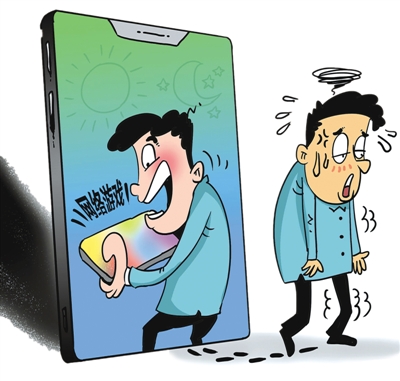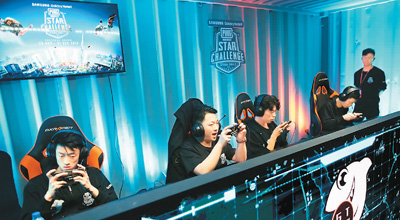

Game addiction is a disease? Recently, a news from the World Health Assembly has sparked heated public opinion.
At the 72nd World Health Assembly held in Geneva, Switzerland not long ago, the 11th Revision of the International Classification of Diseases (ICD-11) was adopted. Among them, "game disorder", as a disease, is included in the classification of "disorder caused by addictive behavior".
Equating game barriers and game addiction with diseases has caused controversy all over the world. There are some supporters waving flags and shouting, and the opponents with clear-cut flags are equally huge. Why do game obstacles become diseases? How to treat it? Discussions around these topics are still going on.
Not even playing for a few days is sick.
To what extent do you become addicted to games? The standard of diagnosis is actually quite "strict".
In ICD-11, the identification of "game obstacles" mainly includes three behavior modes: the control over game behavior is weakened; The priority of playing games is higher than daily life and other normal hobbies; Despite the negative consequences, continuing to play games has caused serious damage to individuals, families, society, education, work or other important fields. In addition, the above behavior patterns need to last for at least 12 months before they can be used as a basis for diagnosis.
"Because the game has affected daily life and lasted for more than one year, only in this way can it belong to ‘ Sick ’ 。” In this regard, Hao Wei, one of the drafters of ICD-11 "Game Obstacles" and the deputy director of the Institute of Mental Health of the Second Xiangya Hospital in China, said that the so-called "Game Obstacles" are not even sick after playing games for several days in a row, but have a detailed diagnostic standard.
This means that either playing games is a "game obstacle". Who has previously issued a document saying that research shows that only a small number of people who participate in digital or video game activities are affected by game obstacles. Dr Vladimir Pozdnyak, Department of Mental Health and Substance Abuse of WHO, also said, "Most people who play video games will not be affected by this obstacle, just as most people who drink alcohol will not be affected by ‘ Alcohol use disorder ’ Influence, but excessive use in certain circumstances will lead to adverse effects. "
Nevertheless, why has the game alone become the target of public criticism? Behind the "game obstacle" is actually a response to people’s health concerns caused by electronic devices.
WHO pointed out that the inclusion of "game barriers" in mental and behavioral disorders is aimed at solving a series of concerns about the impact of excessive use of electronic devices on public health. However, in the process of evaluating the existing evidence and research, the participating experts did not find enough evidence to include any technology-driven behavioral addiction such as "smartphone addiction".
Comparatively speaking, the scientific research results of "game obstacles" are more abundant. Hao Wei said that medical research has found that game addiction has "withdrawal symptoms" similar to chemical addiction. For example, the brain images of some people who are addicted to games are similar to those who are addicted to chemical substances.
Give priority to with psychotherapy.
Since "game obstacle" is a disease, how should it be treated?
Previously, there have been some treatment institutions for "internet addiction teenagers" in many places, and they have adopted extreme methods such as corporal punishment and electric shock to "treat", which has caused great controversy. Experts said that although WHO did not provide specific treatment guidance for "game barriers", for medical institutions, this move made relevant diagnosis and treatment well-founded. Health professionals can pay more attention to this obstacle and promote more research on the prevention and treatment of game obstacles.
It is reported that in Beijing, Guangzhou and other places, some professional hospitals have carried out treatment and research on game obstacles.
A few days ago, Beijing huilongguan hospital Behavioral Addiction Ward was officially opened, which is the first behavioral addiction treatment ward opened by public mental health medical institutions in China, and mainly treats patients with behavioral addiction such as game disorder and gambling disorder.
Yang Kebing, deputy director of the hospital, said that the current treatment cycle of game addiction is 6 weeks — 8 weeks, divided into two stages. The treatment method is mainly psychotherapy, and there are 10 cognitive behavioral therapy modules, including interpersonal relationship management, family therapy, self-emotional management and so on. The first 4 weeks — In 6 weeks, patients should completely abstain from internet and mobile phones. During this period, the hospital will carry out outward bound training, and replace the game in various ways. For the next two weeks, patients were taught to use the internet healthily by limiting the use time.
At present, the addiction ward is an open ward, which is equipped with a single bed, a writing desk, a sofa and green plants, and family members can also accompany the treatment. In the group therapy room, a mini KTV has been specially set up to help patients have fun outside the game.
"If the patient seriously affects social interaction because of the game, he should go to the hospital for evaluation in time." Yang Fude, president of Beijing huilongguan hospital, said that the addiction ward can ensure the continuity of treatment, patients can easily build up the trust between doctors and patients with the help of fixed medical staff, and continuous evaluation can better follow up patients’ illness. At the same time, the hospital can provide more comprehensive treatment methods, which will help solve the problem with serious symptoms.
Advocate healthy ways of playing games.
Although it has been officially included in ICD-11, the "quarrel" around game addiction continues.
Just after the adoption of the resolution, game organizations from Europe, North America and Australia, South Korea, South Africa, Brazil and other countries and regions jointly issued a statement, hoping that WHO could re-examine the resolution. The statement said: "‘ Game obstacle ’ It is not based on strong enough evidence, and it is not enough to be included in the most important standard of ICD. "
Many practitioners in the game industry said that the key to game obstacles lies in "obstacles" rather than "games", so the positive role of games and the development achievements of the game industry should not be denied. At the same time, game companies should strengthen and improve the anti-addiction system of games, avoid teenagers’ excessive games, and create a healthy development space for the game industry.
Some medical staff said that game obstacles are classified as mental illness, not to oppose games, but to oppose games that are harmful to physical and mental health. Medical institutions should help patients with game disorders get rid of out-of-control game behavior, establish a correct game use model, and regain sound social functions.
"The key factor of game addiction is family education." A parent who once sent his children to an internet addiction rehabilitation institution said that the family should give their children enough love and attention, accompany them to grow up, guide them to play rationally, and help them enhance their ability to resist setbacks in the process of growing up.
关于作者